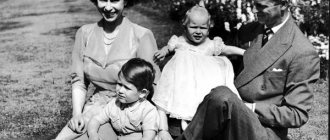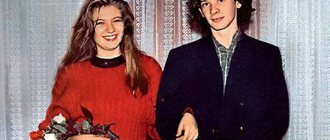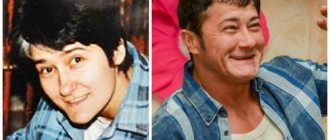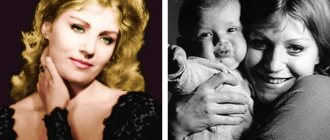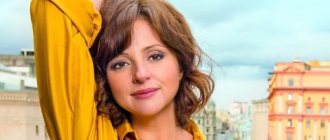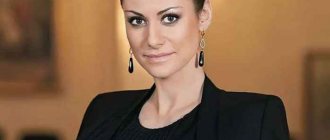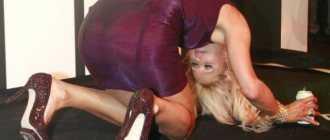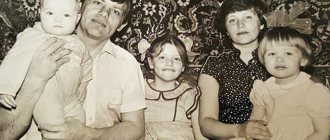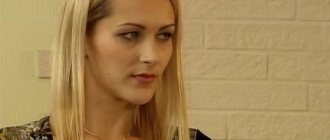Biography: childhood
Kristina Brodskaya was born on December 28, 1990. Her hometown is Vladivostok. This girl was destined to become an actress. After all, she was brought up in a creative and intelligent family. Christina's father and mother are dramatic actors. They managed to build a successful career in their native Vladivostok. And their daughter went further - she conquered Moscow and gained all-Russian fame. But we'll talk about this a little later.
Our heroine grew up as a smart and active girl. She enjoyed singing, dancing and drawing. At school, Christina received B's and A's. Teachers always praised her for her exemplary behavior, good academic performance and active participation in the life of the class.
Kristina Brodskaya: biography
The young actress Kristina Brodskaya appeared on the screens not so long ago: she has been acting since 2011. But many of the actress’s works, including the sensational projects “A Matter of Honor”, “ Gregory R.
", "Split" and "Tatiana's Night" were warmly received by the audience and highly praised by film critics. However, can this be surprising, since Christina was brought up in a family where acting is a dynastic profession.
Actress Kristina Brodskaya
Video course “Spring”
Landscaping for busy people, a beautiful garden without the hassle
A training course for those who want to make their dacha beautiful and prefer to spend their time, effort and money wisely.
Special offer! 50% discount! Make good use of your self-isolation!
₽ 1200.00 ₽ 600.00
MORE ❯❯❯
Kristina Brodskaya was born in December 1990 in Vladivostok into a well-known theatrical family in the region. Her grandparents are actors of the Musical Comedy Theater, and her parents Ilona Nikolaevna and David Anatolyevich are Honored Artists of the Russian Federation, leading actors of the Academic Drama Theater in Omsk.
In 2003, Christina had a younger brother, Sasha. Most likely, Alexander will also continue the dynasty: he has already played several roles on stage.
Kristina Brodskaya
Christina grew up as a musical child and loved to sing with her dad, but she never dreamed of becoming a singer. The girl did not change family traditions and went to study acting at the Academy of Theater Arts in St. Petersburg.
In 2013, Kristina Brodskaya graduated from the academy with a degree in Drama and Film Theater Artist. She studied on the course of the talented teacher and People's Artist of the Russian Federation Semyon Spivak.
Student years
Who did Kristina Brodskaya dream of becoming? Of course, an actress. After graduating from high school, the girl began to implement her plans. To do this, she went to St. Petersburg. Our heroine submitted documents to SPbGATI. The bright and talented girl managed to win over the members of the selection committee. Christina was enrolled in S. Spivak’s course.
After graduating from high school, she got a job at the youth theater on the Fontanka. What kind of performances did Christina Brodskaya not participate in? Photos of the girl were featured on posters.
Filming
Our heroine's film debut took place in 2011. She was approved for the main role in the film “A Matter of Honor”. The young actress successfully got used to the image of Kristina Korneeva. In the same year, several more films with Brodskaya’s participation were released.
Today, the actress’s creative repertoire includes over 20 roles in TV series and feature films. Let's list her most successful and memorable works:
- “My Dear Man” (2011) – nurse;
- “Split” (2011) - Liya Rozanova;
- “Underground passage” (2012) - Nastya;
- “Scouts” (2013) – cadet;
- "Gregory R." (2014) - Princess Dolgorukova;
- “Born by a Star” (2015) - Irina Tumanova.
Personal life
Brodskaya Christina is an actress who does not like to attend social events and nightclubs. She rarely uses social networks and tries to hide her personal life from strangers.
Several years ago, the young actress began an affair with actor Artem Krylov. Christina's friends and relatives were sure that things were heading towards a wedding. However, fate had its own way.
During a trip to St. Petersburg, Kristina Brodskaya (see photo above) met a colleague in the acting workshop, Igor Petrenko. Many of us know him from the films “Driver for Vera” and “Lucky Pashka”.
Kristina Brodskaya and Igor Petrenko immediately liked each other. But at that time they were both not free. And for the sake of the emerging love, the actors broke off relations with their former halves. Christina announced to Artem that she was leaving. Igor Petrenko filed for divorce from his wife Katya Klimova. The former spouses maintained friendly relations.
At the beginning of 2014, fans of the acting couple learned good news - Kristina Brodskaya and Igor Petrenko are expecting a child together. Many immediately began to congratulate the couple on such a joyful event.
On December 24, 2014, in one of the St. Petersburg clinics, our heroine gave birth to a charming daughter. The baby received the double name Sofia-Carolina. The young family moved to Moscow. Several times a year, Kristina Brodskaya and Igor Petrenko, as well as their daughter, travel to sunny Crimea. After all, sea air is good for everyone.
Kristina's parents moved from Vladivostok to Moscow to be closer to their daughter and granddaughter. The mother teaches our heroine how to care for the baby, and the father provides moral and financial assistance.
Despite having a child together, Kristina Brodskaya and Igor Petrenko are in no hurry to formalize their relationship. They live in a civil marriage and consider themselves happy people. Well, we can only be happy for them!
Anna Brodskaya: “I want to stretch out this reading for the rest of my life”
Anna Alexandra Brodskaya-Sozzani, 22 years old, beautiful, lives on benefits in rural England, plans to study to become an illustrator in Italy, but is unlikely to find a job in her specialty, since she fundamentally does not want to sell art.
— How do you introduce yourself when you meet?
- Hi my name is Anna.
- So you started a conversation in the pub. They ask you what you do, what do you answer? How do you define yourself? Not the first thing, obviously. But anyway. I'm supposedly from somewhere, doing this.
- It's a long story. I was born in New York and lived there for ten years. Then I spent seven years in Italy, then I moved to England and have been there for five years. I now live in the country, quite isolated, with my partner and two-year-old daughter.
— That’s why you have such a pleasant British accent. And in general the voice is beautiful. Have you thought about an acting career?
— As a child, as a little girl, I thought maybe. But now I don't like this idea at all.
— Tell us about your education - you definitely studied somewhere.
- Yes. First, in America, in Brooklyn, I attended a very good art school, then, already in Italy, a British school, and when I turned 17, my mother sent me to an English boarding school in Cambridge. Things didn't work out very well for me there. The buildings are located in such a way that it is impossible not to be late for classes by at least five minutes. Because everything is in different parts of the city. And if you are consistently late, you are locked in a room from 7 pm to 8 am. So I jumped out of the window and ran away. I was expelled from there after about a year. Then I started studying in London, but by that time I was already quite disillusioned with the university environment and soon dropped out.
— What was your major?
“I didn’t drop out of university, but high school.” We studied photography, theater, and English literature. I also learned Italian.
— You know that Joseph Brodsky also dropped out of school in high school.
- Yes. Public education is too regulated. The teaching style and lesson format only suit a select few. But for the most part, this is not so much education as programming to grow up and integrate into society, to get a job. This is an unnatural environment for a developing person.
© Alexey Tikhonov / Colta.ru
— Did you grow up on Morton Street?
- No, I was born there, but soon we moved to Brooklyn Heights.
— Did you know who you were from early childhood? Genetically. That is, you don’t remember yourself without this knowledge?
- About dad? Yes, I always knew this. There were photographs of him hanging at home. I have several memories of him. Plus his friends. And various other things. I remember reading his poem “Törnfallet,” dedicated to my mother, in Sweden, exactly there. When I realized this, I grabbed the book and ran across the “Swedish meadow”, shouting these lines.
— In England, when you communicate with someone in everyday life, do people often understand who you are? Whose daughter are you?
- No. He's not that famous in England. Certainly not the same as in Russia.
- And in America?
— I lived there 11 years ago. As a little girl. I only communicated with children.
— You probably speak Italian fluently.
- Not so bad. I haven’t lived there for five years now, so I’ll have to tighten it up.
- French?
— I taught at school.
- That is…
- Hardly ever. I can say “Jeu voodre le poisson” and “Ye le fromage?”
— How come you don’t speak Russian?
— Unfortunately, it was not possible. At the age of 9 I studied Russian with a teacher, but she died of a brain tumor. At the age of 10, I moved to Italy, where, of course, I had to speak Italian. This took several years. And then at the age of 17 I ended up in an English boarding school, and there learning Russian could not become a priority. Then my daughter was born, and again there was no time for it. Now she goes to kindergarten, and I want to take up Russian. My sister and babushka promised to give me lessons.
© Alexey Tikhonov / Colta.ru
— Do you communicate with Russian relatives?
- Do you mean with babushka after your mother?
- Both with her and with others.
- With Andrey (Andrey Basmanov, son of Joseph Brodsky - Ed.)? We met the other day. We went to a restaurant with a translator. We had a nice time.
— Yesterday (at the Akhmatova Museum) you gave a fiery speech against copyright and received applause. The strange thing is that there were people sitting in the hall who had more than once had to contact the Brodsky Foundation for permission to publish.
— I spoke not on behalf of the foundation, but on my own behalf. I cannot and do not want to speak on behalf of the foundation, these are my own beliefs. I believe that copyright is an outdated concept.
— Do you think that any copyright should be abolished?
— In my opinion, in today’s world, where everything is rapidly digitized, all this will inevitably become a thing of the past.
— In the information age, information is capital.
- This is all because of monetarism. And it often turns out that what is good for humanity cannot be the subject of monetary relations. For the overall benefit, you have to spend maximum energy, getting the minimum in return. But in the monetarist paradigm the opposite is true. People strive to spend a minimum of energy and get the maximum in return. And this perverted understanding of values lies at the foundation of our culture. Hence the problems. Everyone should have the right to the best there is in the world. This applies to both science and literature... Because we are placed in a situation where people are forced to compete in order to sell their work, the meaning of the artist, who in principle wants to share his art with as many people as possible, is distorted.
— If we remember the major artists of the 20th century, with a few exceptions they all sold themselves very well.
“This behavior is dictated by our environment.” But imagine a society in which money plays no role.
- Communism.
- No. Projects such as the communist one tried to achieve equality, but remained within the monetarist paradigm. Hence the depressing result. Imagine an economic model in which there is no longer any need to sell your labor. People would then just create. Einstein, for example, was not paid. Or Tesla. But they went about their business because they had an internal need. Therefore, it is unfair that an artist who shares his art should at the same time understand that if he does not sell anything, he will live worse.
© Alexey Tikhonov / Colta.ru
— Do you think books shouldn’t be sold? Just give it away?
- It would be great. Buckminster Fuller said that instead of fighting the existing reality, we should try to create a new one. New system, new model. Therefore, rather than worrying about small details, you need to look at the root: the cause of all evil is monetarism.
— Did you vote for Russell Brand?
- No. It seems like he didn’t get to the point of announcing his candidacy, but I don’t vote at all. Even if the elections were not rigged - and they are - most politicians defend the interests of large corporations and speak about what they need. Therefore, they do not raise serious issues such as biodiversity or inequality. They talk only about superficial things.
— Al Gore seems to talk a lot about the environment.
— You see, if you try to change something in the monetarist paradigm, nothing will work. Because people are interested in financial results and are not interested in the changes that should happen. For example, Greenpeace is a non-profit organization that relies on donations. I don’t know the exact data, but I suspect that the biggest sacrifice is the meat industry, which is responsible for deforestation of the Amazon jungle. So that cows could graze there or grain could be grown to feed livestock. But since it is one of the largest sources of funding, Greenpeace cannot talk about such a huge force destabilizing the environment, but instead raises other, smaller issues. Because environmentalists are also interested in financial results. It's not their fault. This will always happen in the monetarist paradigm, in which egoism is immanent.
- It's part of human nature.
— Human nature is in our DNA, but our behavior is determined by our environment.
It is human nature to cooperate in principle. The system based on competition forces us to do the opposite. Let's take, for example, a lazy person who doesn't want to hit a finger. He also has the right to life, to be himself. And the system forces him to hunker down at uninspiring work. Day after day. And it corrupts.
© Alexey Tikhonov / Colta.ru
“You are so against competition, but art is built on it.”
— I believe that there is also a place for competition. In children's games, in sports. In friendly competition. But in principle, competition undermines the foundations of human dignity. It's much better to cooperate. And build your communication with people on this. Let's leave competition to sports. There should always be a choice. You can't force a person to compete. Some rare people benefit from this. But it is impossible to build a social model that benefits a few. This is unfair. And so we will not all be able to realize our potential.
— In St. Petersburg you are received like a princess. Like a rock star. Camera flashes.
“Everyone here is infinitely kind to me.” Total hospitality. Everyone is in a hurry to tell how dear my father and his books were to them. But apart from yesterday’s readings at the Akhmatova Museum, I was not followed by photographers.
— How are you with social networks?
- I have Twitter.
— Facebook?
- No. I deleted my account and have no intention of renewing it.
— But Facebook is just about the free exchange of information.
- No. It's all advertising and algorithms. If you like something, you are shown something similar. And in the end you find yourself in a kind of cocoon. And you see only what pleases you. This is no longer cooperation, but segregation. You are cutting off some people. In addition, as you know, all information from Facebook goes straight into the databases of the US National Security Agency.
- Isn’t it the same in life? You choose your friends, you choose with whom to communicate.
“That’s true, but Facebook imitates the worst, most superficial thing in life.
— In one essay, your father called on all office employees to demand from their superiors that homeless people be allowed into buildings at night. Have you read it?
- No. I didn't read my father much. Several poems, essays from Less Than One, no, from the book On Grief and Reason. I want to stretch this out throughout my life so that our relationship lasts as long as possible. So that you can always read something new.
At the request of COLTA.RU, Anna Brodskaya read two poems for us. One is “Bosnia Tune” by Brodsky. The second is the text of London MC Roots Manuva.
We thank Anton Zhelnov for the opportunity to show this recording and remind readers that the full version of the film “Brodsky is not a poet” will be available soon at the Moscow Documentary Film Center.
Subscribe to our updates
Weekly COLTA.RU newsletter about the most interesting things in 7 days
Feed of our current updates in Yandex.Zen
RSS news feed COLTA.RU
Tweet Did you like the material? Help the site!

